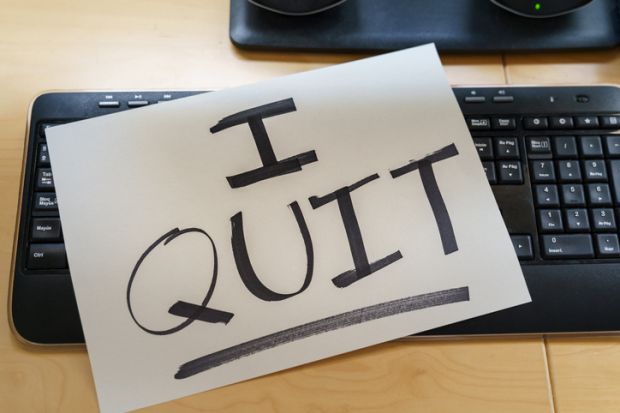UK Research and Innovation is facing mounting pushback against its suspension of an equality body over social media posts by some of its members relating to the Israel-Hamas conflict, with some academics resigning from voluntary positions in protest and a union warning that it could call on more scholars to do the same.
UKRI announced on 31 October that it was suspending Research England’s equality, diversity and inclusion advisory group, after science secretary Michelle Donelan said that this would be her “strong preference”.
In a letter to UKRI chief executive Dame Ottoline Leyser, Ms Donelan had said she was “outraged” that one group member had described the Westminster government’s plans to crack down on support for Hamas in the UK as “disturbing” and condemned the “amplification” by another academic of a post that condemned violence on both sides but referenced Israel’s “genocide and apartheid”.
While the minister insisted that academic freedom was “sacrosanct”, she warned that “public bodies, or those representing them, cannot be seen to take political positions let alone promote extremist ideologies”.
Even prior to UKRI’s response, Ms Donelan’s intervention had already sparked a strong response among academics, with more than 2,500 signing a letter that “categorically refute[s] the suggestion that expressions of support for Palestinian civilians and their right to engage in organised political resistance can be equated with support for Hamas”.
After the equalities group was suspended, several academics announced their resignations from voluntary positions with UKRI funding councils. They included Claire Squires, professor of publishing studies at the University of Stirling, who says she was “extremely concerned about UKRI bowing to pressure from the UK government, particularly in terms of the curtailment of academic freedom of expression with regards to Israel and Gaza”.
“The response from UKRI has sent a strong message that UKRI cares far more about aligning with the UK government’s agenda…than serving its academic, research and stakeholder communities,” Professor Squires wrote in a letter to the Arts and Humanities Research Council’s peer review college.
Resigning from the same college, Matt Bennett, a senior research officer at the University of Essex, branded Ms Donelan’s intervention as “at best ministerial overreach and at worst a frightening attack on academic freedom”.
“[Ms Donelan] has taken the opportunity of a highly politicised public debate about recent atrocities in Israel and Gaza to interfere in the operations of an independent public body,” Dr Bennett wrote.
“In the process, she has undermined the integrity of the primary governing body for UK public research funding, cast doubt on the political independence of UK research, poured fuel on the fire of our current crisis of public distrust in science, and instigated a witch-hunt within UK academia to root out and label as extremists individual academics who dissent – within the law and the right to free speech – from the government’s foreign policy.”
Now the University and College Union has warned that, if UKRI does not reverse its decision within 48 hours, it will call on its members to resign from voluntary positions with the funding body.
“It is deeply disappointing that, instead of pushing back against the inappropriate and disproportionate demands which were a thinly veiled excuse to attack wider equality, diversity and inclusion efforts, UKRI has capitulated to unwarranted pressure and in doing so offered validity to this intervention by opting to suspend the advisory board,” said Jo Grady, UCU’s general secretary.
“This cowardly decision has had a serious impact on the sector’s confidence in the independence of UKRI’s decision-making processes.
“It is absolutely paramount to the protection of academic freedom that bodies that administer research funding are able to operate free from the whim of ministerial diktat. UKRI’s actions over the last three days have given academics cause to think carefully about whether, given the politicisation of the organisation, they wish to continue to serve on UKRI bodies.”
In a letter to Ms Donelan, Dame Ottoline said she was “deeply concerned about the issues you raise in your letter and I am taking swift and robust action accordingly”. A review would determine the “ultimate future” of the advisory group, she said.
A UKRI spokeswoman said: “We understand why some in our community feel the need to resign from UKRI advisory roles. We are grateful for their service and hope that relationships can be healed in the future.
“The approach we are taking is difficult for some to accept. We are adopting a well-governed process to support evidenced, principled decisions. The aim is to bring clear resolution in a way that best supports the people involved and research and innovation in the UK.”




